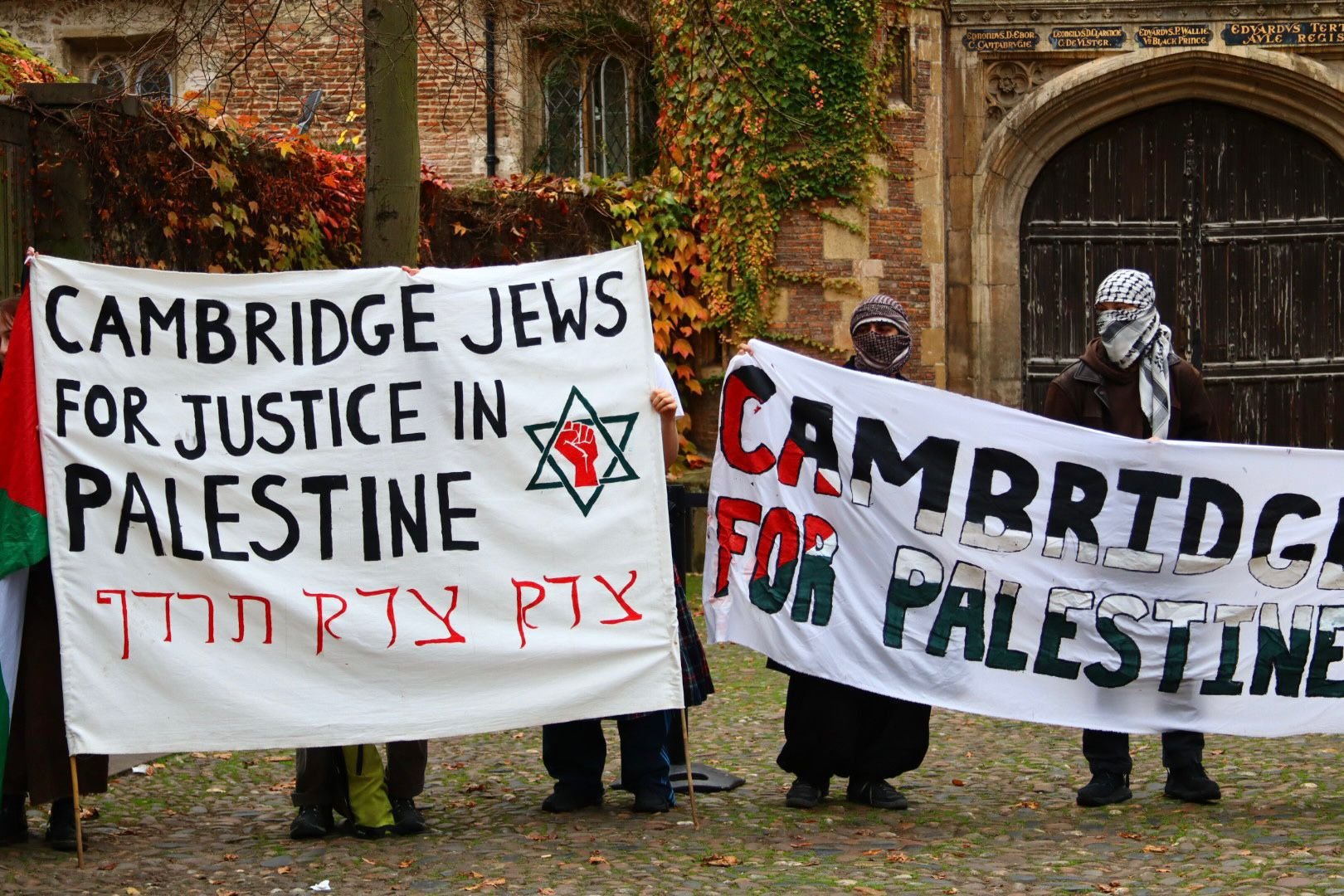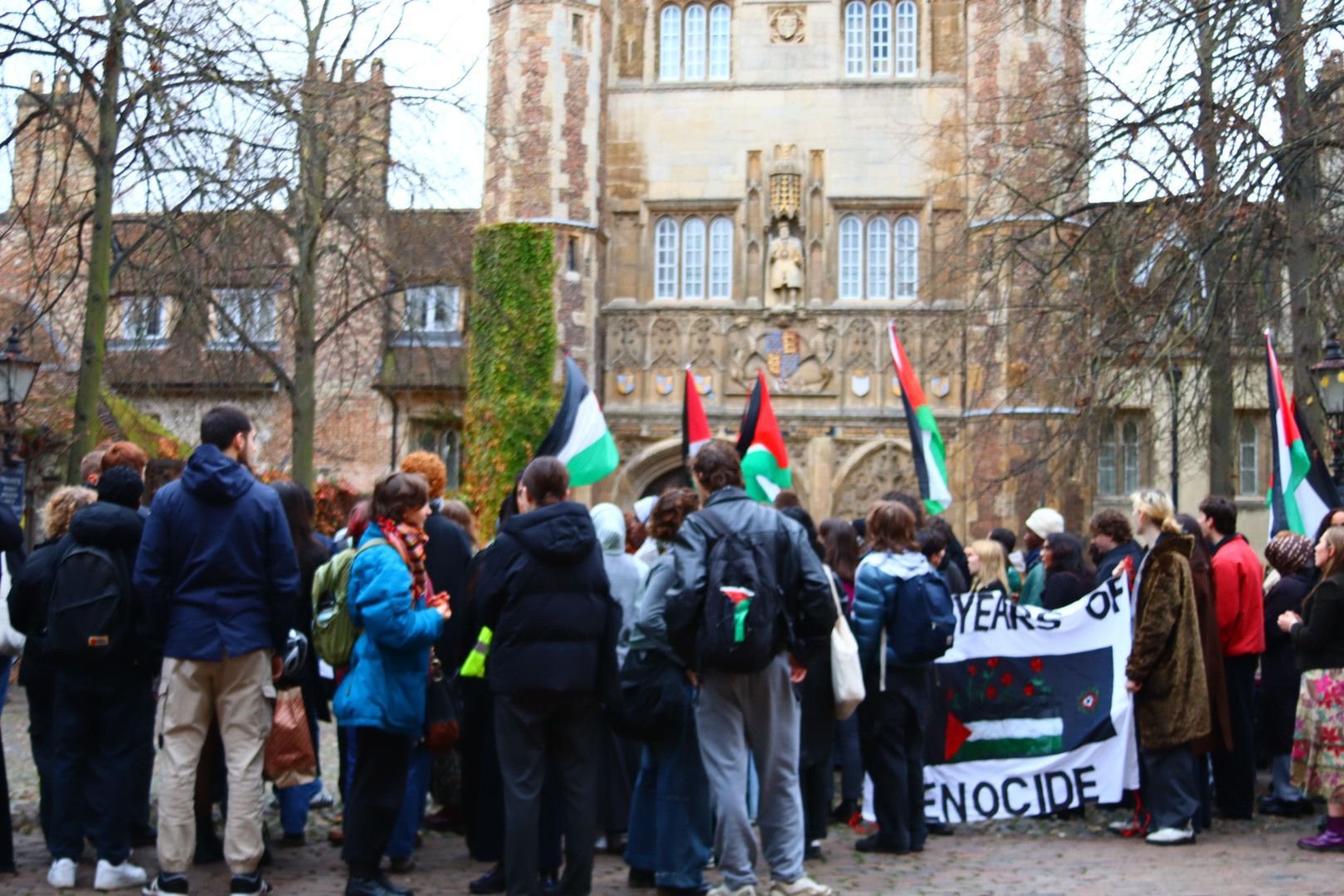Doublespeak and Deception: The University of Cambridge's Masterful Evasion of Palestine Accountability
Mila Edensor assesses the University of Cambridge’s ongoing complicity in the Israeli occupation of Palestine, arguing that the institution’s public relations campaign of “good faith” serves to obscure its continued investments in companies complicit in genocide.
On the 15th of November, it was reported that, in the masters' own words, Trinity College, Cambridge has “no interest in divesting from arms companies”. This coincides with alarming news from Cambridge for Palestine that the university has been treating student efforts towards divestment with what one can only characterise as an underhanded contempt.
Despite the Working Group for Palestine having been established since before the summer break, and further, despite the fact that students had established they would be willing to negotiate outside of term time, a first meeting is still yet to have taken place. Given this context, it is obvious why a clarifying update as to the Working Group’s status was highly anticipated. However, upon finally receiving an update, the student body has instead been left with an overwhelming sense of disappointment, frustration and disbelief.
By weaponising bureaucracy, the university has chosen to attack student power at its roots. In this update, the word ‘Palestine’ itself has been removed from all discussion. The original task force of 6 students and 6 faculty members has been reduced to just two students, now expected to face a room of university appointees in an isolated and intimidating environment. Furthermore, discussions touching on multiple aspects of genocidal complicity have been conflated with a separate motion that only covers ‘arms investments’ - consequently, diluting the remit of negotiations by an unacceptably significant degree.
And it is within this decision where a chilling conclusion becomes increasingly impossible to ignore. Given mass popular opposition to the atrocities inflicted upon the Palestinian people, the university has always known that overt support for Israel would be publicly untenable. Therefore, if the university wanted to maintain support for Israel - in any situation - it would have no choice but to perform a facade of engagement. A worrying image appears; could it be, that in place of a negotiating partner, honest and reliable - students have effectively been in dialogue with a public relations campaign?
In the summer, the International Court of Justice declared “Israel’s occupation of the Gaza strip and the West Bank, including East Jerusalem” to be “unlawful (...)”. Yet, the University remained steadfast in its resistance against divestment. And now, even as Francesca Albanese, the UN Special Rapporteur for Palestine describes herself as “a reluctant chronicler of genocide” - the university has chosen to push the timeline back for the Working Group by over six months.
So, how has the university been able to justify continued investment in complicit companies, despite such statements from international organisations? Through a masterfully executed public relations campaign, it has crafted an image of good faith, effectively obscuring its decision to maintain a £122 million pound investment in these companies.
One such instance of this: following an agreement with the university, the encampment was dismantled - the headline from the Telegraph reading, “Cambridge tells protesters it will review arms investments if they leave their tents”. This media narrative gave the university positive press, and it looked as if progress towards divestment had been achieved. However, considering the bureaucratic stalling of negotiations, and the systematic weakening of student power, it is glaringly obvious that no such agreement was ever truly desired. The university presented a facade of good faith, allowing for the circulation of positive press while, in material terms, theirs was a policy of continued investment.
Photo of protests against Trinity College backtracking from their claims of divestment, taken by Ami Khawaja
Even worse, at the height of the student protests, Trinity College, Cambridge allowed for the circulation of reports that it had voted to divest. For example, the Middle East Eye published on the 12th of May: “Cambridge's wealthiest college votes to divest from arms companies”. And yet, when pressed on the matter, the college made no effort to rectify this narrative, The Cradle writing the following day that “Trinity College did not confirm or deny the report about divestment from arms manufacturers, stating only that ‘Trinity College continues to review its investments regularly’”.
Now knowing that the college 1) has not divested, and 2) the Master has ‘no interest’ in divestment - it can be fairly assumed that this was the same stance held in May. Whether this decision was purposeful or not is irrelevant; in material terms, the college’s reputation benefited from these stories. In a decisive moment, at the height of the protests, student anger was placated by widespread news - from reputable sources - of divestment. Both the college and the university have facilitated the presumption of progress and presented an image of good faith - yet ultimately, they continue to hold substantial investments in companies complicit in Israeli genocide.
Perhaps it was obvious that the university viewed student protests as merely an inconvenience to be managed, with no genuine intention of ever divesting. In May - despite the presence of the encampment just outside - King’s College, Cambridge hosted a panel featuring Gillian Tett (King’s Provost), Vice-Chancellor Deborah Prentice, and notably, the Director of GCHQ alongside an NSA official.
Despite Declassified UK reporting that the “UK military has flown 200 spy missions over Gaza in support of Israel” “over the past 5 months” - the college was happy to host UK intelligence leadership. Similarly, the college honoured a representative of US intelligence, even as the NSA itself describes its relationship with Israeli intelligence as involving the exchange of information on “access, intercept, targeting, language, analysis, and reporting.”
It shouldn't be surprising that a core institution within the British establishment aligns itself with western imperialism - but it is still hard not to be taken aback by the level of duplicity presented by the university. In a way, the very act of presenting an image of good faith serves as an admission of guilt - a confession that they fully understand their moral obligations in the face of genocide. After all, the ability to feign doing the right thing requires at bare minimum an understanding of what the right thing would entail.
Photo of protests against Trinity College backtracking from their claims of divestment, taken by Ami Khawaja
Glossing over the paradox between its words and its actions, the university has communicated with the press and the student body using a tone of stilted and paternalistic professionalism. But politeness, non-violence, and a muted reaction on the part of the powerful should never be taken as a sign of well being, good faith, and honesty. It simply means that you are being ignored. It means that the moral compass of university leadership is contented and fulfilled by meeting the slim obligations of British politeness. It means that they are satisfied to move through the world with a thin-lipped smile while their professional life is spent ensuring the continuity of university investment in a genocidal regime.
Even further, it is evident that what students are facing today is a tactic used by a wider coalition of complicit powers.
For example, in the face of rising public outrage, a letter penned by the US Secretaries of both State and Defense was disseminated amongst the press, alluding to the idea that military aid to Israel was at risk as a punishment for restricting humanitarian aid into Gaza. The following month, it was then decided that military aid would in fact not be cut, after the Israeli government supposedly demonstrated progress in the right direction. This comes as IDF sources state there is no intention of allowing aid into northern Gaza. In summary, the US government presented a facade of good faith, all the while maintaining a policy of support for Israel - engaging in this duplicitous practice because they know that their actual position is publicly untenable.
And for the same reason, the UK scrapped 30 of its 350 arms export licences to Israel (less than 10%), to portray a level of consideration for the Palestinian people, all the while continuing to support Israel’s “right to self defence” and continuing to deny that the systematic slaughter of +44,000 Palestinians constitutes a genocide.
Rather than lose hope, we should recognize that it is precisely those with the power to influence the situation who engage in this practice of doublespeak and deception. By proving itself as a key pillar of Israeli legitimacy and support, the university has also revealed its potential as a catalyst for change. Should it choose to divest, the ripple effects could signal the crumbling of a broader regime of complicity. In this sense, it should solidify in our minds that the student body at the University of Cambridge has an increased obligation towards the Palestinian people, such would be the societal and political impact of university divestment.
Behind the stone walls of Senate House, are those with access to the levers of imperial power, are those who are choosing not to use their privileges to put an end to the atrocities. In the face of a genocide, the supposed adults in the room are treating the situation with a childish avoidance, and with cowardice and complicity. In North Gaza, new depths of inhumanity have been inflicted upon one of the planet's most vulnerable peoples - and new depths of dishonesty have consequently been shown by those with the power to stop it.
The university must be told, through unrelenting pressure and protest, that the student body sees through its dishonesty. While not admitting as such publicly, the Israeli government seems to be gearing towards a permanent occupation of North Gaza. In the face of this assault on humanity, we have no choice but to demand a complete separation from all complicit companies. Facing death on all sides, be it through airstrikes, bullets or famine, the palestinian people have been failed by the international community. They must not be abandoned; we cannot afford to fail them.
The opinions in this article are not representative of ‘The Cambridge Student’ and are only the views of the author.


